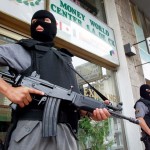Mexico's Drug War: Made in the USA
 In 2010, Mexico’s drug war reached new levels of brutality. That violence though will only worsen unless the U.S. acts to cut drug consumption.
In 2010, Mexico’s drug war reached new levels of brutality. That violence though will only worsen unless the U.S. acts to cut drug consumption.
In 2010, Mexico’s drug war reached new levels of brutality. However, as my latest column for CNN points out, that violence will only worsen unless the U.S. acts to cut illegal drug consumption.
The lesson of the past few years: Watch out for things that can go massively wrong. What could go massively wrong in 2011?
Let's start next door, with Mexico.
From the Dallas Morning News, January 1:
"Mexico's drug violence in 2010 was striking not only for its scale but also for its brutality.
In the northern city of Santiago, the mayor's body was found with the eyes gouged out. In the picturesque town of Cuernavaca, four decapitated men were hanged from a bridge along a heavily traveled highway. And in Ciudad Juárez this week, two university students were hunted through a maze of streets and killed with bullets to the head, their bodies set on fire."
An estimated 13,000 people met a violent death in Mexico in 2010, compared with 9,600 in 2009. Altogether, perhaps 26,000 people have died violently since the acceleration of the drug war in 2006.
The violence rages with special intensity in the city of Ciudad Juarez, across the border from El Paso, Texas. The Associated Press reported October 23:
"Gunmen stormed two neighboring homes and massacred 14 young people at a birthday party in the latest large-scale attack in this violent border city ...
Attackers in two vehicles pulled up to the houses in a lower-middle-class Ciudad Juarez neighborhood late Friday and opened fire on about four dozen partygoers gathered for a 15-year-old boy's birthday party.
The dead identified so far were 13 to 32 years old, including six women and girls. ... The majority of the victims were high school students, a survivor said."
Why attack a birthday party? Mexico's rival criminal gangs are fighting for control of the drug trade to the United States. Perhaps one of the partygoers was a member of a rival gang. Or a gang member's child. Or nephew. Or perhaps the attacking gang simply had the wrong address.
In Ciudad Juarez, more than 3,000 people were killed in 2010. It's really Mexico's own 9/11.
Mexican authorities have struggled to restore order. More than 100 police officers have died in Juarez, often horrifically. But so far, the security forces are not winning. Dangerously often, the police are themselves the problem. Bribed or intimidated, some outright work for the drug cartels.
The war in Mexico is not only Mexico's problem. The U.S. and Mexico are increasingly interpenetrated. About one out of every 8 Mexican-born people has moved to the United States, often illegally. Depending on the price of oil at any given moment, remittances from the United States are Mexico's No. 1 or No. 2 source of international earnings.
U.S. citizens traveling in Mexico have been attacked and killed, sometimes by traffickers, sometimes by security forces, six of them in the last week of October 2010. But then again, American citizens traveling in Mexico sometimes are the traffickers, or so the Mexican authorities allege.
And of course, the drugs that move through Mexico are destined for American consumers. ...
Click here to read the rest.